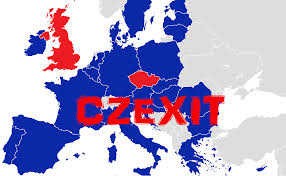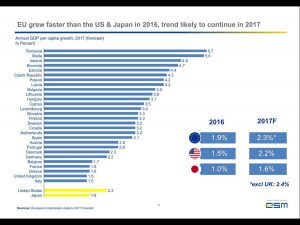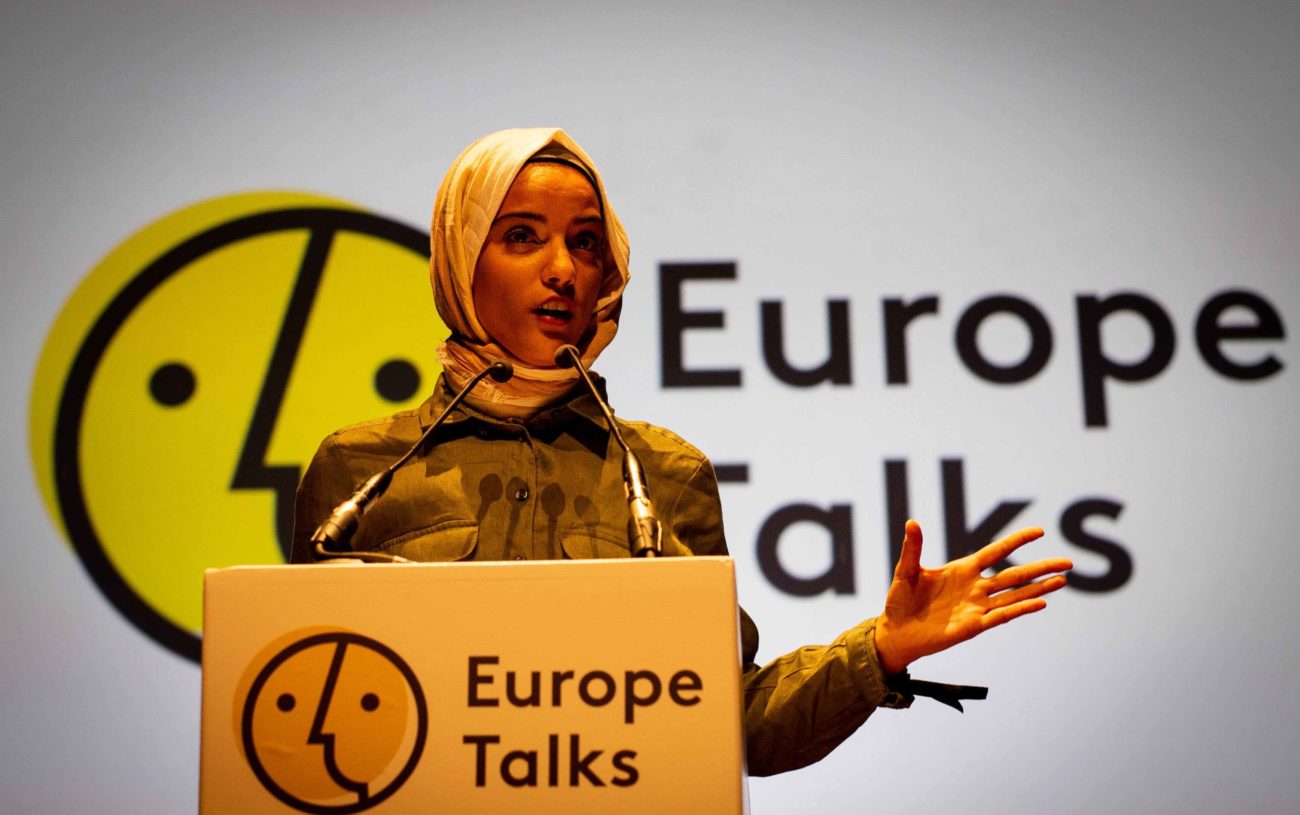The email from the Financial Times wasn’t one of the regular ones. It was headed “Join an exciting new project that connects people who disagree”. It continued “In an era of online finger-pointing and ideological filter bubbles, when was the last time you had a thoughtful face-to-face conversation with someone with whom you disagree?” It described how it would work :
Category: British politics and life
The continuing mess of Brexit; Part 2

Before you Czexit, check out Brexit!
Czechs are apparently among the most Eurosceptic peoples in the EU. While the results in the latest Eurobarometer show an improvement in attitudes towards the EU, Czechs still appear to be far more negative than the Poles, the Slovaks or even the Hungarians. The reasons behind this deserve discussion in a separate blogpost, but the upshot is that certain politicians, particularly the far-right politician Tomio Okamura, have encouraged talk of a referendum on EU membership. So for any Czech citizens reading this who feel persuaded that Czexit might be a good thing, I urge you to consider the following insights from the Brexit referendum :
The continuing mess of Brexit, and what Czechs can learn from it (part 1)
 Part One – why it is (probably) happening
Part One – why it is (probably) happening
Brexit hasn’t happened yet. 18 months on from the referendum, the British are hardly any clearer about what their country and their lives will be like after it leaves the EU; and this despite the fact that every single day, something to do with Brexit dominates the serious news channels.
At the very least, it has become clearer to many who voted for Brexit that the process of leaving the EU is far more complex than their political leaders had claimed. I doubt that on the day of the referendum more than 5% of the population could correctly state what Euratom is, or that the European Court of Human Rights is not an EU institution. Well, now they are finding these things out. Drip, drip, drip…the truth about Brexit comes out in little drips.
What’s really wrong about Uber. It’s not the app…

On October 2nd, Prague’s taxi drivers, with their brilliant sense of PR, decided once again to protest about Uber by blockading the airport. What great memories all the tourists will have of their weekend in Prague. But this time, the taxi drivers seemed to have some international allies . A few days earlier, in a move that really attracted global interest, Uber lost its licence to operate in London. It reminded people that Uber had problems in other parts of the world too.
The arguments roared into life in both London and Prague. In both cities many people felt Uber were giving them a cheaper alternative to “expensive” taxi drivers. Young people in particular argued that taxis are ‘the past”; Uber with its app and its new way of working with drivers was part of the cool new world, together with AirBnB. Uber of course have encouraged that thinking. But in fact, the arguments in the two cities are not the same, and I would like to describe the difference to you.
But more importantly, thanks to an article in a really obscure London magazine devoted to London transport issues, I will show you that the real problem with Uber is one that the mainstream media has not picked up. In fact, I don’t think even the Czech Minister of Transport, Dan Tok, has picked it up yet. I hope he may read this…
Vladimir Šmicer should show fans more respect.
I was really surprised to learn of Vladimir Šmicer’s comments regarding fan protests at Sparta, and especially his assertion that such protests don’t happen in England. As I will show, this assertion is completely wrong.
It is 12 years since Šmicer left England. In that time, the money in English football has grown to an almost ridiculous level, and clubs have been bought by owners or companies who have not always had the best intentions. Šmicer focuses on Sparta fans protesting about the coach, but he surely knows that the fans are more discontent with the ownership of Daniel Kretinsky. Here for the benefit of Mr Šmicer is a quick tour around the many clubs whose stadia he has played at, where fans have recently been protesting against owners.
Where better to start than at Šmicer’s old club, Liverpool. Here they are in February last year, protesting about ticket prices. They walk out of the stadium on 77 minutes.
In exactly the same month, fans of once mighty Leeds United, owned by a clearly mad Italian with a criminal record, Massimo Cellino, used a projector to beam their protest messages onto the side of the stadium
Of course Manchester United have been protesting for much longer about the ownership of the Glazier family. Some have gone so far as to set up a new club, FC United of Manchester, which now has its own stadium and often attracts around 5,000 fans (about the same as Slavia on a bad day..)
Blackburn Rovers, once champions, are now in the 3rd division under the ownership of the Venky family of India. They have made their money in chicken farming, so fans recruited a live chicken to help their protests.
https://www.youtube.com/watch?v=FYWI3XXfExw
There have been protests against the owners of Newcastle, Aston Villa, Hull City, Cardiff, and Coventry in the years since Šmicer last played in England. I would like to think that among the most creative protests are those at my club, Charlton Athletic. Šmicer played against Charlton in the Premier League, but under the bizarre ownership of Belgian businessman Roland Duchatelet we are now, like Blackburn, in the 3rd division
Šmicer describes the protesting fans as ‘radicals’. It is certainly true that protests usually come from those parts of the stadia where the noisiest fans congregate, but he is quite wrong if he thinks that most fans disapprove of the protests at English clubs. I doubt he knows what the non -radical Sparta fans think of the current ownership regime either. He speaks of the ‘respect’ shown by fans in England, which he says is missing here in the Czech Republic. He seems to suggest that fans should respect club owners. Well, Mr Šmicer, in England, respect has to be earned. The problem in the cases I have shown above is that club owners have dis-respected fans. Even in the often empty stadia of the Czech league it remains true that without the fans, football is irrelevant. Mr Šmicer will remember the wonderful English coach, Sir Bobby Robson. But he may have forgotten one of Sir Bobby’s most famous quotes:
“What is a club in any case? Not the buildings or the directors or the people who are paid to represent it. It’s not the television contracts, get-out clauses, marketing departments or executive boxes. It’s the noise, the passion, the feeling of belonging, the pride in your city. It’s a small boy clambering up stadium steps for the very first time, gripping his father’s hand, gawping at that hallowed stretch of turf beneath him and, without being able to do a thing about it, falling in love.”
British Justice has failed Zdeněk Makar

Part 1
There are many things wrong with British society, and I have never been afraid to speak of them to Czechs; I hope that then, if I claim something about Britain is really good, they will believe me rather than just suppose I am being “patriotic”.
One of those good things, I always argue, is the British justice system. When I first heard the dreadful news of the murder of Czech citizen, Zdeněk Makar, in London last autumn, I tried to reassure my Czech friends that our police will get the killer, and he will face justice.
The police did their job. Raymond Sculley was very quickly arrested and charged with murder. It’s usually a good sign, when an arrest and charges follow quickly. It suggests the police have received clear and damning evidence. In the meantime details had emerged of “Zed” in the press and social media. I quickly gained the impression of a hard-working and able young man who had gone to Britain to build a career and enrich his life experience, and was clearly succeeding. He had a group of friends there from the Central European countries, equally decent, and now horribly bereft. They organised a fund to ensure he could be returned home to lay to rest.
